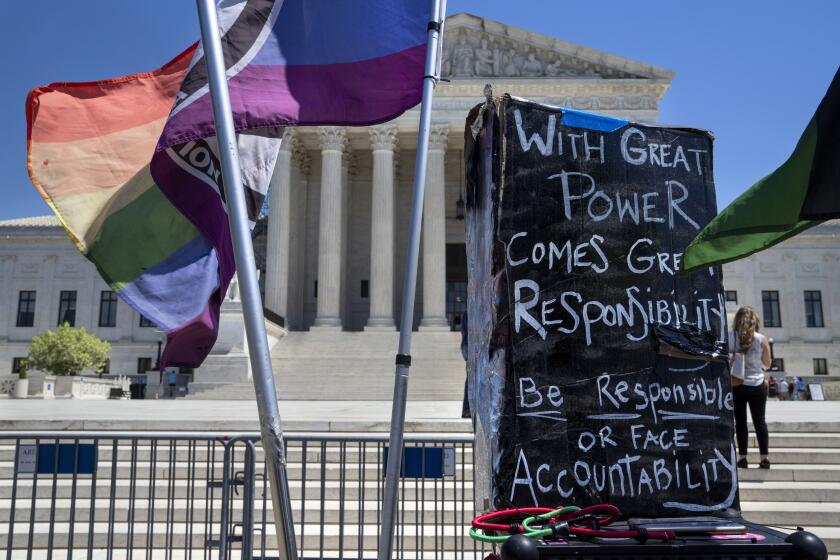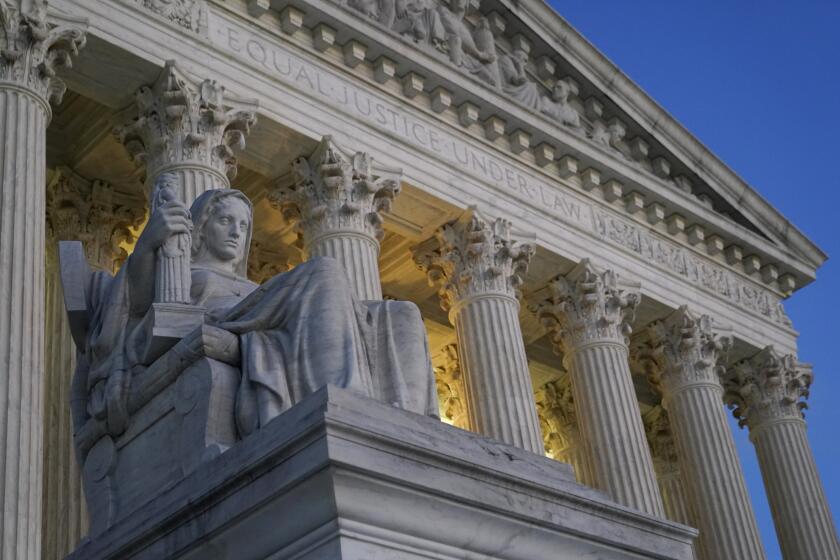Florida Supreme Court upholds state’s 15-week ban on most abortions

- Share via
TALLAHASSEE, Fla. — The Florida Supreme Court on Monday paved the way for a ban on abortions after six weeks of pregnancy, before many women know they are pregnant, while also giving voters a chance to remove restrictions in November and restore abortion rights in most cases.
The court that was reshaped by former presidential candidate and Republican Gov. Ron DeSantis ruled 6-1 to uphold the state’s ban on most abortions after 15 weeks of pregnancy, meaning a ban on six weeks could soon take effect. But under a separate ruling, the court allowed a ballot measure on abortions rights to go to voters.
Most abortions are obtained before the 15-week mark, so the current ban does not affect most people seeking abortion. But a six-week ban would likely have a major impact on women seeking abortions in Florida and throughout the South.
DeSantis, who signed the 15-week ban in 2022, appointed five of the court’s seven justices.
The high court is weighing a case that could rewrite the rules of care in more than two-thirds of U.S. abortions, limiting access to a popular drug even in states where it remains legal.
The lawsuit challenging the ban was brought by Planned Parenthood, the American Civil Liberties Union and others. They argued the Florida Constitution’s unique privacy clause for more than 40 years has explicitly protected a right to abortion in the state and should remain in force.
Lawyers for the state, however, said when the privacy clause was adopted by voter referendum in 1980, few people understood it would cover abortion. They told the justices the clause was mainly meant to cover “informational privacy” such as personal records and not abortion.
Since the U.S. Supreme Court overturned Roe vs. Wade in June 2022, most Republican-controlled states have adopted bans or restrictions on abortions. Every ban has faced a court challenge.
The justices may turn back the clock on medication abortion, the procedure most women in both red and blue states use to terminate pregnancy.
A survey of abortion providers conducted for the Society of Family Planning, which advocates for abortion access, found that Florida had the second-largest surge in the total number of abortions provided since Roe vs. Wade was overturned. The state’s data shows that more than 7,700 women from other states received abortions in Florida in 2023.
The neighboring or nearby states of Alabama, Louisiana and Mississippi are among the 14 states with bans now in place on abortion in stages of pregnancy, with limited exceptions. Georgia and South Carolina bar it once cardiac activity can be detected, which is generally considered to be around six weeks into pregnancy.
Farrington writes for the Associated Press. AP writers Geoff Mulvihill in Cherry Hill, N.J.; Terry Spencer in Fort Lauderdale, Fla.; Mike Schneider in Orlando, Fla.; Curt Anderson in St. Petersburg, Fla.; and David Fischer in Miami contributed to this report.
More to Read
Sign up for Essential California
The most important California stories and recommendations in your inbox every morning.
You may occasionally receive promotional content from the Los Angeles Times.














